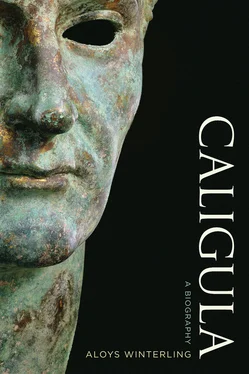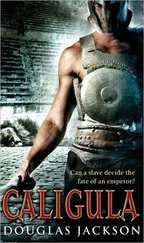Figure 2. Bust of Caligula. Heraklion, Archaeological Museum, 64.
How did this contradictory, historically unique combination of republic and monarchy come about? One social and one political reason can be named. Like all highly developed pre-modern cultures, ancient Rome had a stratified society, with a deep division between the nobility and the non-noble population. The exercise of authority, whether in the military or in the civic sphere, had always been limited to members of the upper class. Even though the common people were included in the political process during the Republic, it was precisely their behavior that reserved authority for the noble families. For although elections were held regularly and were technically open to non-noble candidates, again and again those elected to political office (and thus to positions of military leadership) came almost exclusively from the same noble families. They were evidently the only men whom the common people were prepared to obey. Every emperor faced this situation. He needed the leading members of the nobility to command the Roman legions throughout the Empire and to perform civic functions in Rome itself. This group was identical, however, to the approximately six hundred men who composed the membership of the Senate — the most important Republican political institution — and the core of the Roman aristocracy, with whom an emperor thus had to have some kind of workable entente.
A second reason for the situation was more banal, but just as important. It involved the mortal danger to which all participants were exposed. The civil wars of the late Republic had shown what ruthlessness military leaders were capable of in dealing with their fellow aristocrats. Since the time of Sulla there had been repeated proscriptions in which political and personal opponents had simply been liquidated. Conversely, however, it had become apparent that in Rome bayonets did not make a good throne, so to speak. The fate of the all-powerful dictator Caesar, the adoptive father of Augustus, had shown that the aristocratic Roman resistance to all forms of monarchy could stiffen into assassination, even within the circle of the ruler’s most trusted followers. Conspiracy and murder, ever justifiable for removing tyrants, became swords of Damocles hanging over the head of every emperor from then on. As the coming centuries were to show, more than a few would fall victim to them.
Augustus’s answer to this situation was the paradoxical establishment of sole rule through restoration of the old Republic. His particular achievement consisted in demonstrating that such a thing was possible. Augustus’s precedent, however, proved exceedingly difficult to follow. Attempts to reproduce it became the dominant feature of the period after his death in the year 14, and thus also of the world in which his great-grandson Caligula came of age. Two central problems above all rapidly became apparent: the personal inadequacy of possible successors for the difficult role of emperor, and the complicating politicization of the imperial family (a process that could be observed even during Augustus’s lifetime).
Augustus’s style of ruling demanded both a high degree of dissimulation regarding his own position and great skill in handling power. For several centuries a social system had been established based on an immediate link between political power and social status. The members of the aristocracy, whose goal in life — as in other pre-modern aristocratic societies — was to acquire honor and fame, depended for that purpose on exercising political functions and holding office as magistrates. Success in these endeavors determined an individual’s ranking in the social hierarchy of the aristocracy, and this status was visible in many aspects of everyday life: in the order in which senators voted; in seating at theatrical performances in Rome; in the number of followers who paid morning calls at the home of a successful aristocratic politician and accompanied him to the Forum; in the location and size of his house, and in the luxury displayed there, especially at dinners and banquets.
One condition of Augustus’s success was his willingness, in social situations, to dispense with displays of the political power he had acquired. In daily life he behaved like an ordinary senator, maintaining friendships with other aristocrats as if they were equals, refraining from appearing in public with a large retinue, and residing in a house on the Palatine Hill that was reported to be relatively modest by aristocratic standards. Via this renunciation of honors Augustus was evidently following a conscious strategy, to ensure that the aristocracy accepted his position. In so doing he overcame the typical aristocratic mentality, and he was successful primarily because his contemporaries retained their traditional outlook. This was an extraordinary achievement on his part and, as the subsequent history would show, one that few of his successors were willing or able to emulate.
Augustus’s willingness to forgo special honors was connected with a style of ruling that dispensed entirely with giving orders to members of the Senate, but nevertheless offered sufficient clues for them to grasp what his wishes were. Because of his superior position of power the senators automatically obeyed his intimations, in a thoroughly opportunistic manner that sometimes even anticipated any actual hint or sign. Yet it was decisive that traditional forms were observed. Thus it was sufficient for the emperor to break off his personal friendship with a recalcitrant senator and deny him admittance to his house. Immediately other senators would see to it that he was charged with a crime and brought to trial; as a result the careers of the emperor’s “enemies” soon came to an end, and often their lives as well. The art in Augustus’s dealings with the aristocracy consisted in making such serious cases the rare exception, even though a whole series of conspiracies against him were discovered and exposed.
Augustus implemented wise policies on particular issues, such as increasing the security of the Empire and its infrastructure, adding architectural adornments to Rome, or keeping its citizens supplied with grain. But fundamentally his grip on success came not from policy, but from his personal ability to master paradoxical demands in communicating with the aristocracy: ruling without giving orders, wielding power without appearing to do so. At the end of his life, it is reported, he sent for the members of his inner circle, delivered a cynical commentary on the times, and asked for a round of applause, like a star retiring from the stage. His immediate successor would demonstrate that such acting skills were rare among the Roman aristocracy.
THE POLITICAL FAMILY
Because Augustus had not introduced a monarchy in a constitutional sense, arranging instead for the institutions of the Republic to grant him special powers tailored to his own needs, it was an open question who would legally succeed him. The characteristic motto of hereditary monarchies—“The king is dead; long live the king!”—did not apply to the Roman Empire. In Theodor Mommsen’s classic phrase, “by law the Principate died with the princeps .” Every time an emperor died, someone had to emerge as the next wielder of supreme power, to be proclaimed emperor by the army, and to be confirmed by the Senate. In the worst-case scenario — as it played out after Nero’s death in the year 68 or that of Commodus in 192—that meant the outbreak of a new civil war, until one of the claimants emerged as victor. Normally an emperor would make arrangements for the succession during his lifetime. It was crucial, however, that in principle he had a free hand to choose a successor. To start with, the identity of the next emperor was an open question.
Читать дальше




